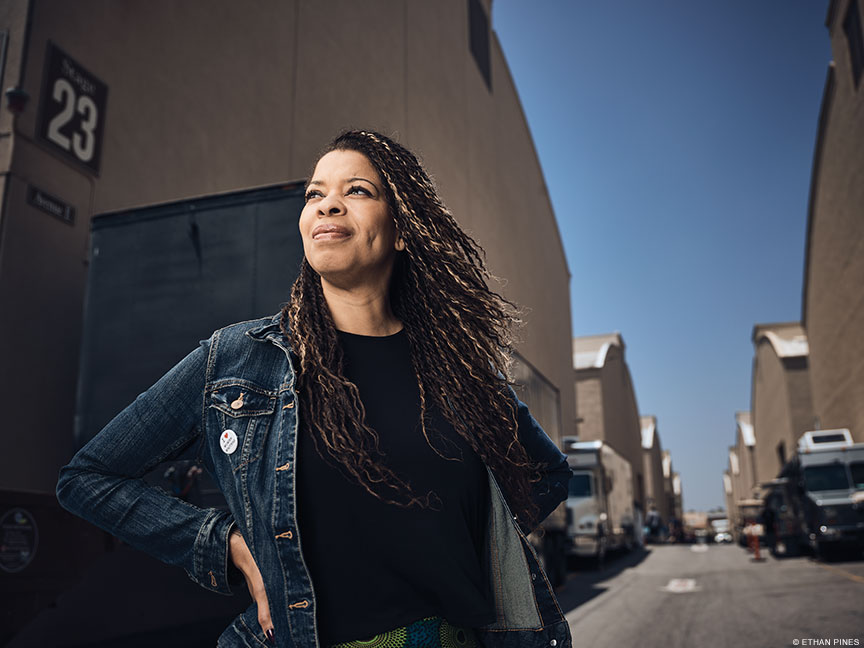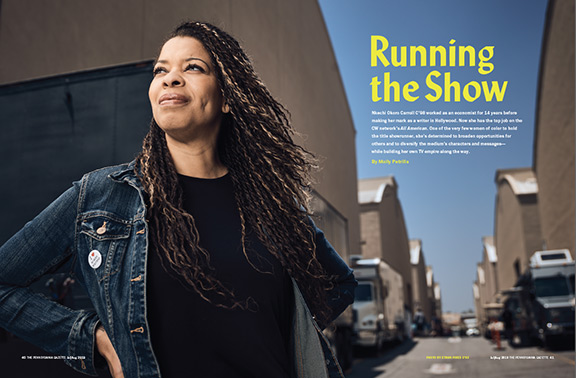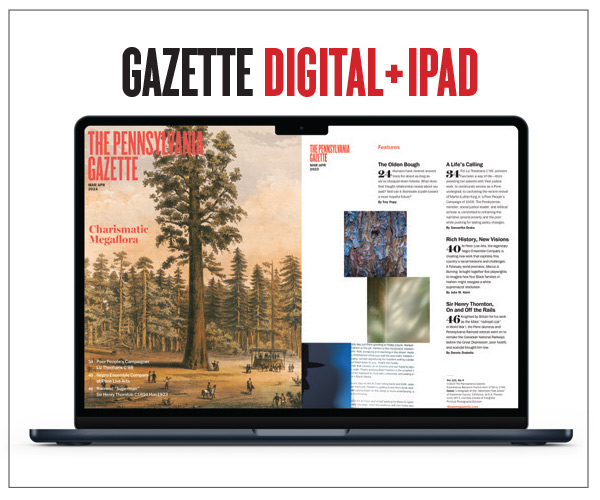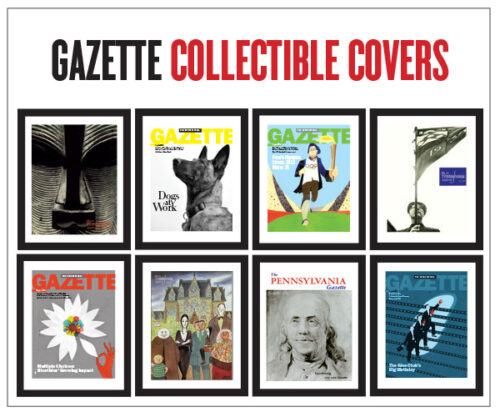
Nkechi Okoro Carroll C’98 worked as an economist for 14 years before making her mark as a writer in Hollywood. Now she has the top job on the CW network’s All American. One of the very few women of color to hold the title showrunner, she’s determined to broaden opportunities for others and to diversify the medium’s characters and messages—while building her own TV empire along the way.
BY MOLLY PETRILLA | Photo by Ethan Pines C’92

In the early 2000s, when Nkechi Okoro Carroll C’98 still lived in New York, still toiled as an analyst at the Federal Reserve Bank, and still acted in tiny black-box theaters at night, she made a vision board.
It was a mash-up of her dreams and goals: pictures of actors she admired, images of Oscar and Emmy statuettes, snapshots of happy families—and a photo of the showrunner for Dawson’s Creek.
“I was obsessed with that show” she says now. “Obsessed.”
So obsessed that she had even read up on the soapy teen drama’s behind-the-scenes characters. After discovering that a twentysomething named Greg Berlanti had shot from staff writer to showrunner in only a year, “I was like, THAT!,” Carroll remembers thinking. She couldn’t quite explain why his swift rise from entry-level scribe to the show’s top post affected her so deeply. She just knew that he belonged on her board, so up he went.
Twenty years later, Carroll swaps text messages with Berlanti almost every day and counts him as a mentor. Like Berlanti, she was recently promoted to showrunner of a soapy teen drama. Hers is a CW network series called All American. Berlanti’s company produces it.
On the surface, it’s all very full-circle, go magic vision board, go! But scratch off that sparkly veneer and there’s something more significant underneath. In last year’s TV staffing season, only 24 percent of showrunners hired were women, and an even smaller number—just 12 percent—were people of color, according to data from the Writers Guild of America West. As an African American woman, that puts Carroll’s statistical chances of getting where she has somewhere between tiny and slight.
She doesn’t point out how odds-defying it is that she made this career happen. She doesn’t complain about how hard it all was, or talk about the nights she fell asleep on her keyboard typing screenplays (her husband shares that detail, though). “Failure just wasn’t an option,” she says. “If I ran up against an obstacle, I was going to figure out a way around it.”
“To know her is to know that if she puts her mind to something, it’s going to work out,” says Carroll’s husband, Jonathan Carroll C’99. He’s had a front-row seat to his wife’s career since 2000, watching her transform herself from gainfully employed economist into gainfully employed TV writer, producer, and now showrunner.
“When you talk about black people in particular, there’s often this singular, one-dimensional way that we have historically been portrayed on television,” Jon adds. “We’re starting to see a little of that change.” He doesn’t spell it out, but the subtext is clear: Carroll, the stories and characters she’s putting on screen, her presence in writers’ rooms, the fact that she climbed up to the peak of running her own show—it’s all part of that change.
It’s nighttime and two black teenage boys are on their way home from a football game, riding top-down in a glossy red Mustang. Then a police siren intrudes. Red and blue lights splash across their faces.
“What the hell?” says Jordan, the driver, who grew up wealthy in Beverly Hills. He squints into his rearview mirror and pulls over.
A cop approaches the car. “Is there a problem, officer?” Jordan asks. In the passenger seat next to him, Spencer, born and raised in tough South Los Angeles, quietly stretches out both his arms and places his hands, fingers spread, on the dashboard—a gesture that says he’s unarmed and cooperating.
Jordan continues to argue with the cop that he hasn’t done anything wrong. Soon both boys have been handcuffed and slammed onto the sidewalk.
They eventually make it back to Jordan’s mansion safely, but everyone is shaken. As Spencer later explains, shocked by his new friend’s naiveté around police: “By the time I was eight, my Moms made it clear: cops like that, they see my blackness as a weapon. So you talk slow, you do as they ask, you keep your hands visible, and you never run.”
It could just as easily pass for a documentary, but that meditation on police brutality and racial profiling—and how little wealth protects people from either—comes straight from an episode of All American that Carroll wrote last year, shortly before she became the series’ new showrunner. Inspired by the life of retired NFL linebacker Spencer Paysinger, the show centers on an African American teen who’s recruited from rough Crenshaw to play football for his team’s ritzy rival, Beverly Hills High School.
“It was an episode for my sons and an episode about the reality of conversations that black parents have to have with their boys,” Carroll says. It’s also an episode that “I feel like moved the needle and hopefully continues to move the needle,” she adds.
The cop scene wasn’t something she chose at random, just as it wasn’t random when she wrote about child soldiers from Sierra Leone in an episode of Bones or spotlighted an often-misdiagnosed medical condition on The Resident—an episode that people are still sending her thank-you letters for. In the seven years that she’s been writing on network TV shows, Carroll has carefully and purposefully infused her work with subjects she cares about.
“As a country, we consume a lot of television,” she says. “TV has an influence. I’m always looking at my writing as an opportunity to reach millions of people and find a way to make a change for the better.”
When she was hired as a co-executive producer on All American last year, Carroll saw it as another chance to tell the stories she wanted people to hear—especially her young, African American sons, ages 12 and seven.
“There’s this idea that there’s something about the African American male that scares people,” she says. “I’m raising two black boys right now and fearful of that constantly. If I can remind people that they’re just regular boys like everyone else and deserve a chance and a shot like everyone else, then that’s my way of using my pen to try and make a difference in the narrative in this country right now.”
To Jameal Turner, a writer who’s worked with Carroll on both Rosewood and All American, his friend’s talents extend beyond artful messaging. “She’s a story genius who’s great at capturing real emotion,” he says. The same episode she wrote with the racial profiling scenes is also filled with relatable parent-teen turmoil and teen-teen turmoil. Another luxuriates in high school love triangles at a homecoming dance. Reviewers have compared the show to hit teen dramas past, including The O.C. and Friday Night Lights.
Carroll admits she has a soft spot for sudsy stories, whether it’s actual soap operas (she records every new General Hospital episode and watches old ones on Netflix), romance novels (Jackie Collins fills her shelves), or her all-time favorite TV show, Buffy the Vampire Slayer. Well into adulthood, both her inner romantic and inner teenager are still alive and well-tended.
“I’m a sucker for romance,” she says. Actually, make that “a die-hard romantic.”
“Maybe it’s optimistic, maybe it’s naïve,” she adds. “But I am such a firm believer in happily ever after.”
If there’s a show out there with a compelling will-they-or-won’t-they couple, chances are Carroll has already found it, watched it, and gotten hooked on it.
She sees her love story with Jon as a real-life version of the classic trope. “Jon and I were in and out of each other’s lives for years before we dated,” she says. They knew each other in passing at Penn, had friends that overlapped, but in their free time, Jon was usually at swim practice and Carroll was usually acting in plays.
In April 2000, Nkechi (she pronounces it “En-kay-chee”) and Jon both went to see a mutual friend perform at the Soul Café in New York City. John Legend C’99 (still John Stephens back then) was the opener. Nkechi was there on a date with someone else. Now she and Jon have been together for 19 years.
By the time they met, Nkechi had already lived on three continents. She was born in New York City, the youngest of four kids, to Nigerian parents who had come to the US for college and decided to stay. Growing up, she stuck close to her mom’s side—to the point that family and friends jokingly referred to her as her mom’s handbag.
“My siblings would argue that I was spoiled being the baby of the family,” she says, “but I don’t recall it that way.”
Her dad worked as a lawyer, and when she was four years old, he moved the family back to Nigeria for his job. Just before her eighth birthday, Carroll’s parents split up and she relocated again—this time to the Ivory Coast with her mom and siblings. That’s where all of her strongest childhood memories are set: sprinting between her home and her cousins’ house; hanging out with her best friend at a shack that served “the best steak and fries ever”; ice skating at a rink outside the Hôtel Ivoire.
But after a handful of years, it was off to boarding school in Oxford, England, where she fell in love with Shakespeare, wrote her own Harlequin romance novel at age 13, and joined the Oxford Youth Theater as a performer.
“I look back now and think, how blessed was I to have such a global upbringing?” she says. “It felt completely normal for all of us to always have passports.”
On All American, Spencer moves to Beverly Hills for school and football, but heads home to South LA often, constantly toggling and readjusting between the two places—much like Carroll did throughout her own transcontinental childhood: New York/Nigera; Ivory Coast/England; West Philly/Ivory Coast.
“In All American, you’re writing about walking between two worlds, and she’s done that,” Jon, who works as a middle school dean, says of his wife. “She’s so knowledgeable about so many different aspects of the world, her tastes are so varied, and her identity is so unique, and she brings all of that into the writers’ room.”
A passion for the arts had already revealed itself before Carroll arrived at Penn, but “I also have a very healthy sense of livelihood,” she says, so she double-majored in economics and French while writing short stories and plays for fun in her spare time. She also directed and acted in shows with the African American Arts Alliance and became president of the Pan African Student Association.
Carroll met Chika Chukudebelu W’99 early in her freshman year and the two remain close friends. Chukudebelu remembers Carroll as a bubbly, upbeat girl who was always smiling—but at the same time driven and hard-working.
“I think she’s stayed the same person personality-wise,” says Chukudebelu, who also broke into Hollywood post-Penn and now works as vice president of development at Universal Content Productions. “She’s always been that effervescent, super-warm person who says exactly what she thinks and would give anyone the shirt off her back.”
When she prepared to leave Penn in 1998, graduating in just three years, Carroll pointed her job search to New York, which seemed like the perfect city to house both her artistic and pragmatic sides.
After working all day at the Federal Reserve Bank of New York, where she served as a trader/analyst, she’d spend her nights taking acting classes and putting on plays in small theaters. “I’d catch a few hours of sleep and then be back on the trading desk the next morning,” she remembers.
She also went on TV auditions, although very few shows were filmed in New York at the time—and the roles open to her as a young African American actor were decidedly limited.
“There weren’t a lot of doctor/banker/lawyer roles,” she says. “It was always ‘gangster’s girlfriend’ or ‘girl from the streets.’ That was very frustrating, because that wasn’t who I was, and it wasn’t who a lot of people I knew were. I felt like we needed better representation on screen and we weren’t getting it.”
Around the time she made her vision board, Carroll began teaching herself how to write for TV. Thanks to a fast-growing, still-rather-new internet, she was able to download scripts from many of her favorite writers. She’d watch episodes of The West Wing, Buffy the Vampire Slayer, and Dawson’s Creek while studying their corresponding scripts, figuring out how the writers worked their magic.
“Then I started to write the kind of roles I wanted to be able to play and audition for,” she says.
Meanwhile, back at the Fed, her days were still steeped in interest rates and inter-bank lending. With work footing the bill, she completed a master’s in international economics. But even for someone with seemingly infinite reserves—“a lightning bolt of energy” is how Jon describes his wife—the lack of sleep started to wear thin.
She and Jon left New York in 2004 and moved to LA so that Carroll could break into Hollywood. Still playing it sensible, she got a day job with the Federal Reserve Bank of San Francisco. But she always had a plan.
“I vividly remember when we moved here and she was starting to map out a course in Hollywood: How am I going to meet this person? How am I going to be seen by this person?” Jon says. “She’s willing to do all the research and put in all the time.”
“There was just an attack and a hustle to the way I approached this,” Carroll says.
When she discovered that Gina Prince-Bythewood, the writer/director of Love and Basketball, was a member of the same local moms’ group she was, “I said, one way or another, I am not only going to meet this woman, I will make her my mentor—without turning into a stalker,” Carroll remembers.
She sent Prince-Bythewood an email. Gently followed up. Today the two are developing a feature film together. Another fantasy plucked off the dream board and dropped into Carroll’s real life.
“My mother-in-law and Nkechi’s aunts are all powerful, high-achieving women who are able to bend the world to their will,” says Jon. “It’s definitely a passed-down family and cultural thing. There’s just something about Igbo culture that imbues the kids with this relentless drive for success and achievement.”
After eight years in LA, all the while making her own short films and still working for the Fed by day, in 2012, at age 34, Carroll landed her first TV writing job on The Finder, a FOX procedural drama that had spun off from the network’s long-running series Bones.
She never went back to economics.
When The Finder ended after a single season, Carroll joined the staff of Bones, then went on to write for and co-executive produce Rosewood and The Resident under a deal with 20th Century Fox. Last spring, Warner Bros. snatched her up with a multi-year deal that lets her develop original series for all their platforms—and landed her on the staff of their new show, All American, where she was bumped up to showrunner last October.
Inside both her home office and her office on the Warner Bros. lot, Carroll has the same large, framed photo up on the wall. When she’s wrestling with a script or struggling through any other work crisis, she looks at it.
The picture is from a Hollywood Reporter shoot last November. It features 62 women of color, all of whom currently work as TV writers or have in the past. Carroll is in the top row, close to the middle, in a fitted black tank and colorful printed skirt. She’s beaming.
“I look up at that photo, and just knowing that I’m not in this crazy industry alone—and that these women represent the village I belong to—gets me through every time,” she says.
She launched Black Women Who Brunch, abbreviated to BWB, in March 2014 with writer friends Lena Waithe and Erika L. Johnson. Twelve writers showed up to the first BWB meeting, held in Carroll’s living room. Today the group is nearing a hundred members.
Jon jokes that they had to buy a larger house because BWB meetups got so big. “That group means everything to her,” he says. “It didn’t exist until she built it.”
Carroll traces BWB back to conversations she had with friends when she first started working in Hollywood. They often swapped stories about being the only black women in a TV writers’ room, agreeing that they felt like unicorns: “something awesome, magical, and rare,” she says now.
The hard numbers on how rare emerged this past April, when the Writers Guild of America West released its first Inclusion Report Card. The showrunner statistics are the most extreme, but the data for other high-level TV writing jobs are similar. Of executive producers hired last season, just 17 percent were women and 12 percent were people of color. Co-executive producers: 34 percent women, 23 percent people of color. “Systemic discrimination against writers from historically underrepresented groups remains pervasive,” the WGA report concluded. “We urge all studios and show runners to continue being part of the solution.”
Before she got to All American, Carroll sometimes found herself the lone person of color or woman of color in a writers’ room—and assumed by coworkers to be able to provide storylines for any and all people of color on a show.
“That’s why it’s so important to have representation in the writers’ room,” she says. “You can’t just hire one person of color and be like, ‘Okay, we have the diverse person covered.’ That person can only speak to the reality of their experience. I’ve never spent a day in the ’hood, but I can tell you all about boarding school in England.”
“We knew for a fact that there were other writers out there like us,” she adds, getting back to BWB. She wanted to meet those other writers, to help them, to recommend them for jobs. She wanted to build a village.
Amanda Idoko met Carroll in 2012 at the Austin Film Festival, two years before BWB existed. Carroll was on a writers’ panel and Idoko was a 24-year-old audience member who worked in a law firm. She went up to Carroll after the panel ended and they chatted for a few minutes—about Idoko’s goals, about both coming from Nigerian families.
Later that night, Idoko was headed for the bar when someone grabbed her arm. “It was Nkechi and she said, ‘Here’s my number, if you ever move to LA, hit me up,’” Idoko remembers.
She packed up her stuff and left New York a few months later. Shortly after landing in California, she called Carroll. “I was like, ‘I’m here!’ And she was like, ‘Let’s get coffee,’” Idoko says. “We got coffee. She’s had my back ever since.”
Carroll was writing for Bones, and Idoko became a writer’s assistant for the show. She’s since written for other TV shows, and her film script for Breaking News in Yuba County is set to star Allison Janney and Laura Dern.
“Nkechi’s always been a true supporter,” she says. “She’s always the first call I make when I have a question or I’m worried about something.”
Jon says the whole thing is typical of his wife. “If she’s your friend, then you have an advocate for life,” he says. “She’s going to pour all of herself into supporting you and building you up and making you feel like you can be your best self.”
As the showrunner for All American, one of Carroll’s many responsibilities is leading the writers’ room.
“You’re the head writer, the head producer—you have to do it all, and write some scripts while you’re at it,” she says.
It’s a job that’s notorious for stress and burnout. Hollywood writer/director Joss Whedon, speaking in the 2014 documentary Showrunners: The Art of Running a TV Show, put it like this: “Being a showrunner is utterly consuming … It’s draining. It’s awful. I miss it terribly.”
Or here’s Matthew Carnahan, who ran House of Lies, quoted in the same doc: “Showrunning is like painting a painting while writing a novel while doing your taxes.” And Bill Prady, from The Big Bang Theory: “It is, at the same time, the best and the worst job.”
But even as she works under the constant crush of script rewrites and budget planning and fixing on-set emergencies, Carroll also plans office potlucks and leads afternoon dance breaks. “Maybe it’s because I spent 14 years in corporate America, wishing I was doing this,” she says, “but every day I’m so incredibly grateful to be able to do what I do. I’m usually skipping or singing. Occasionally there’s a cartwheel.”
In early April, back home in LA after a solo trip to France meant to recharge her batteries, she was still waiting to hear whether All American would be renewed for a second season. The viewer numbers were low for season one and the show’s fate hadn’t been announced along with the rest of the CW’s series in January. Still, she was chipper.
“I’m naturally an optimistic person,” she said, a week away from presenting her pitch for season two to the network, two weeks out from learning the show’s fate.
She’d been watching people discover the series on Netflix, where it arrived in late March, and become fans. They’d been tweeting her. She’d been tweeting back. Jon had reported that kids in his school’s cafeteria were finally talking about All American. She took that as a good sign.
While she waited, Carroll was also coming up with ideas for new TV series to pitch at Warner Bros. and working on that film script she’s developing with Prince-Bythewood. “I don’t idle well,” she admitted. “I’m always working on something.”
She sees the deal she signed with Warner Bros. last year as another step toward her original dream: becoming her own version of Greg Berlanti. In 2018, the uber-producer had a record-setting 14 series on the air simultaneously. His company also produced a pilot that Carroll sold to ABC in 2018.
“He’s the goal,” Carroll says. “To build that empire where you have multiple shows on air, not just written by you, but shows where you get to bring up other talented young voices that fit into this brand.”
“It’s not just about her being a showrunner,” Turner says, also invoking the Berlanti model and using the world empire. “She wants to foster careers.”
It’s a big goal—one that most people might not even admit to harboring. But coming from Carroll, the “super duper bright beacon of light” (Turner), the “ball of light and ball of energy” (Idoko), the woman who turned herself from an economist into a Hollywood showrunner through sheer will and work, it’s not hard to envision.
Two weeks after our last interview, Carroll got the news. All American will be back for a second season this fall.
As her husband Jon puts it: “The rocket ship just keeps going up.”
Molly Petrilla C’06 is a freelance writer and frequent contributor to the Gazette. She also writes about all things arts and culture for the Gazette’s blog.





